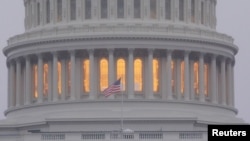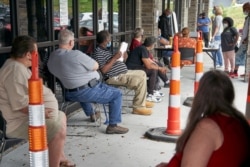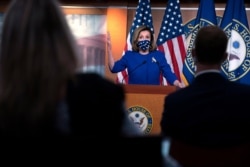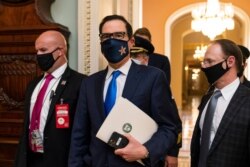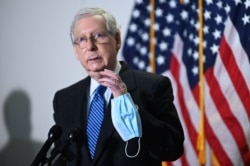There will be no new coronavirus economic relief package in the U.S. before next Tuesday's presidential and congressional elections.
Despite months of negotiations, the White House and Republican and Democratic lawmakers have been unable to reach an agreement to provide more money for American families, businesses and unemployed workers, even as the number of new infections surges by 60,000 to 70,000 a day.
Congress, in a bipartisan accord, approved $3 trillion in coronavirus relief to families, businesses and jobless workers in the first months after the virus swept into the United States from China and Europe in March and April. But that money has largely been spent, as more coronavirus cases are being recorded and the country's world-leading death toll of nearly 227,000 people continues to mount.
More than 8 million U.S. workers remain unemployed, and the national government's $600-a-week unemployment benefits on top of less generous state jobless compensation expired at the end of July. Millions of jobs were lost in the pandemic, and major employers are still announcing thousands of job cuts because of the uncertainty of the country's economic recovery.
Nearly one in three poorer U.S. families with children, disproportionately among minority groups, reported they did not have enough to eat even before federal aid ended. The federal government and some states have taken steps to prevent families who have fallen behind on rent from being evicted, but unpaid rental bills are piling up across the country.
The looming elections leave the fate of more coronavirus aid in a state of limbo.
Plenty of blame is being tossed around in Washington for the hiatus after months of talks and pronouncements by Republican President Donald Trump, his chief negotiator, Treasury Secretary Steven Mnuchin, and House Speaker Nancy Pelosi, leader of the Democrat-controlled House of Representatives.
But what happens after Tuesday's election is uncertain at best. Trump could win reelection or lose to Democratic challenger Joe Biden. Democrats may or may not win control of the Senate. Even if they do, the Republican Senate majority would endure until January. Democrats are widely expected to retain and possibly increase their House majority.
How any of the election results factor into a new coronavirus deal, if one is eventually crafted, is a guessing game.
Trump predicted this week that he would win reelection and that Republicans would take control of both chambers of Congress, exactly the opposite of what most pollsters say their surveys suggest — a Trump loss and a Democratic sweep of the Senate and House.
"Our people should get it — the stimulus," Trump said Tuesday before another day of campaigning. "After the election, we'll get the best stimulus package you've ever seen."
For her part, Pelosi told House Democrats, "The Democratic message to the American people is: 'Help Is on the way. It will be safer, bigger, better and retroactive.' "
Pelosi and Mnuchin were negotiating a package totaling $1.8 trillion to $2.2 trillion in new relief. Trump has at various times said the total was too much, too little or that a deal was off the table. Republican Senate Majority Leader Mitch McConnell said the proposed spending pact was far too costly, but he failed — because of Democratic opposition — to push through a slimmed-down $500 billion aid deal.
"We have been working on coronavirus relief," McConnell told Fox News. "Unfortunately, the speaker [Pelosi] has not been able to agree to anything remotely reasonable."
One survey showed Americans divided over who should be blamed for the stalemate.
A Politico/Morning Consult poll showed 45% of voters blamed Trump and Republican lawmakers, 40% Democrats and 15% did not know.
Pelosi has said a new aid package would include another round of $1,200 payments to most adults in the U.S., more aid to businesses and renewed unemployment insurance, although it was not clear how much or for how long.
After the election, Congress faces a December 11 deadline for approving a new budget for the fiscal year that began October 1 to avoid a government shutdown.
It is possible that a coronavirus relief package could be included then, or after a new presidential term for either Trump or Biden begins January 20, when one of them will be inaugurated for a four-year tenure in the White House.




